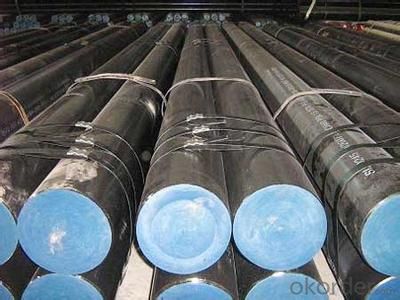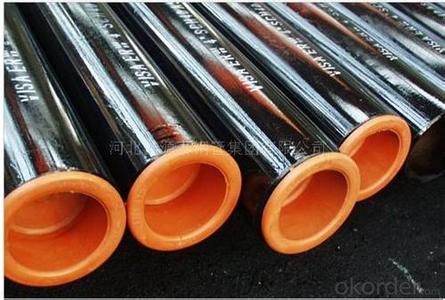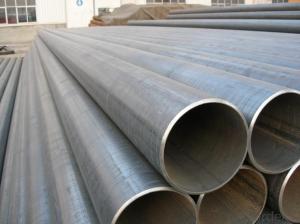API 5L GR.B ERW Steel Pipe
- Loading Port:
- China Main Port
- Payment Terms:
- TT or LC
- Min Order Qty:
- 40 m.t.
- Supply Capability:
- 9000 m.t./month
OKorder Service Pledge
OKorder Financial Service
You Might Also Like
1、Structure of API 5L GR.B ERW Steel Pipe:
ERW steel pipe is electric resistance welding, the abbreviation for ERW for transporting oil and natural gas vapor liquid objects, can meet the requirements of high and low pressure, the transport in the world with pipe sector accounted for a pivotal position.
2、Main Features of API 5L GR.B ERW Steel Pipe:
• High manufacturing accuracy
• High strength
• Good visual effect
• Reasonable price
• Small inertia resistance
• Strong heat dissipation ability
3、API 5L GR.B ERW Steel Pipe Specification:
Standard | GB, DIN, ASTM ASTM A106-2006, ASTM A53-2007 |
Grade | 10#-45#, 16Mn 10#, 20#, 45#, 16Mn |
Thickness | 1 - 33 mm |
Section Shape | Round |
Outer Diameter | 21 - 610mm |
Place of Origin | Tianjin, China (Mainland) |
Secondary Or Not | Non-secondary |
Application | Hydraulic Pipe |
Technique | Cold Drawn |
Certification | API |
Surface Treatment | factory state or painted black |
Special Pipe | API Pipe |
Alloy Or Not | Non-alloy |
Length | 5-12M |
Outer Diameter | 21.3-610mm |
Grade | 20#, 45#, Q345, API J55, API K55, API L80, API N80, API P110, A53B |
Standard | ASME, ASTM |
1) Material:20#(ASTM A 106/A53 GRB.API5LGRB,GB),45#,16Mn,10#.
2) Specification range:OD:21.3-610mm,WT:6-70mm,length:6-12m or according to the requirement of clients.
3) Excutive standards:GB,ASME API5L.ASTM A 106/A53,Despite of the above standards,we can also supply seamless steel pipe with standard of DIN,JIS,and so on,and also develop new products according to the requirements of our clients!
4) Surface:black lacquered,varnish coating or galvanized.
5) Ends:Beveled or square cut,plastic capped,painted.
6) Packing:bundles wrapped with strong steel strip,seaworthy packing.
4、Packaging & Delivery
Packaging Details: | seaworthy package,bundles wrapped with strong steel strip |
Delivery Detail: | 15-30days after received 30%TT |
5、FAQ of API 5L GR.B ERW Steel Pipe:
①How is the quality of your products?
Our products are manufactured strictly according to national and internaional standard, and we take a test
on every pipe before delivered out. If you want see our quality certifications and all kinds of testing report, please just ask us for it.
Guaranteed: If products’ quality don’t accord to discription as we give or the promise before you place order, we promise 100% refund.
②How about price?
Yes, we are factory and be able to give you lowest price below market one, and we have a policy that “ for saving time and absolutely honest business attitude, we quote as lowest as possible for any customer, and discount can be given according to quantity”,if you like bargain and factory price is not low enough as you think, just don’t waste your time.Please trust the quotation we would give you, it is professional one.
③Why should you chose us?
Chose happens because of quality, then price, We can give you both.Additionally, we can also offer professional products inquiry, products knowledge train(for agents), smooth goods delivery, exellent customer solution proposals.Our service formula: good quality+good price+good service=customer’s trust
SGS test is available, customer inspection before shipping is welcome, third party inspection is no problem.
6、 Welded Black ERW Steel Pipe Images:


- Q:Can steel pipes be recycled after their useful life?
- Steel pipes can indeed be recycled once they have served their purpose. Steel, being an incredibly recyclable substance, can be recycled even in the form of pipes. The recycling of steel pipes entails the collection of used pipes, followed by thorough cleaning to eliminate any impurities, and finally transforming them into fresh steel products. This recycling process contributes to the preservation of natural resources, curbs energy usage, and limits waste generation. Moreover, recycling steel pipes aids in mitigating the environmental repercussions linked to the manufacturing of new steel.
- Q:Are steel pipes suitable for underground sewage lines?
- Yes, steel pipes are suitable for underground sewage lines. They are strong, durable, and resistant to corrosion, making them an excellent choice for sewage systems.
- Q:Can steel pipes be used for conveying sewage sludge?
- Yes, steel pipes can be used for conveying sewage sludge. Steel pipes have several properties that make them suitable for this purpose. Firstly, steel pipes are strong and durable, able to withstand the pressure and weight of sewage sludge without collapsing or breaking. This is important as sewage sludge can be heavy and contain solids that may put stress on the pipes. Secondly, steel pipes are resistant to corrosion, which is crucial when conveying sewage sludge that often contains corrosive elements. Corrosion-resistant steel pipes can ensure a longer lifespan and minimize the risk of leaks or damage. Additionally, steel pipes can be manufactured in various sizes and diameters, allowing for flexibility in designing sewage systems to meet specific requirements. However, it is important to note that proper maintenance and regular cleaning should be carried out to prevent the buildup of sludge and maintain the efficiency of the pipes.
- Q:How do you prevent corrosion in steel pipes?
- One effective way to prevent corrosion in steel pipes is by applying a protective coating, such as paint or epoxy, to the surface of the pipes. This barrier creates a physical barrier between the pipe and the surrounding environment, preventing moisture and corrosive agents from coming into direct contact with the steel. Additionally, regular inspection and maintenance of the pipes, including cleaning and repairing any damaged coating, can help identify and address potential issues before they lead to corrosion.
- Q:Are steel pipes suitable for underground gas distribution?
- Yes, steel pipes are suitable for underground gas distribution. They have a high tensile strength, corrosion resistance, and can withstand extreme temperatures, making them an ideal choice for transporting natural gas underground. Additionally, steel pipes are durable and have a long lifespan, making them a reliable option for gas distribution systems.
- Q:What are the different methods of coating steel pipes for insulation?
- There are several methods of coating steel pipes for insulation, including applying a layer of thermal insulation material, such as foam or fiberglass, directly onto the surface of the pipe, using a heat shrink sleeve or tape to wrap around the pipe, or applying a liquid coating that hardens and provides insulation.
- Q:What are the factors affecting the cost of steel pipes?
- The factors affecting the cost of steel pipes include raw material prices, production and manufacturing costs, transportation and logistics expenses, market demand and supply dynamics, import and export tariffs, government regulations, and the overall economic conditions. Additionally, factors such as the grade and quality of steel used, diameter and thickness of the pipes, and any additional features or coatings can also influence the cost.
- Q:Are steel pipes suitable for nuclear power plants?
- Yes, steel pipes are suitable for nuclear power plants. Steel pipes are commonly used in nuclear power plants due to their high strength, durability, and resistance to high temperatures and pressures. They are used for various applications such as transporting coolant, steam, and other fluids within the plant. Additionally, steel pipes can be fabricated to meet specific requirements and withstand the harsh operating conditions of nuclear power plants, making them a reliable and suitable choice for this industry.
- Q:What is the difference between ERW and SAW steel pipes?
- ERW (Electric Resistance Welded) steel pipes are manufactured by rolling metal sheets into a tube shape and then welding the edges together using an electric current. On the other hand, SAW (Submerged Arc Welded) steel pipes are produced by placing a metal plate in a welding machine with a submerged arc welding process. The key difference lies in the welding technique used, with ERW pipes having a welded seam along the length, while SAW pipes have a more uniform and continuous weld. This difference in welding method also affects the overall strength and durability of the pipes, making them suitable for different applications.
- Q:Can steel pipes be used for structural supports in buildings?
- Yes, steel pipes can be used for structural supports in buildings. Steel pipes are known for their strength, durability, and ability to withstand heavy loads. They have high tensile strength, which means they can withstand large amounts of tension and compression without breaking or deforming. This makes them ideal for structural applications in buildings where strong and stable supports are required. Steel pipes can be used for various purposes such as columns, beams, trusses, and even as the main support for the entire building. They are also versatile and can be easily fabricated and customized to fit specific design requirements. Additionally, steel pipes are resistant to fire, corrosion, and pests, making them a reliable choice for long-term structural support in buildings.
1. Manufacturer Overview |
|
|---|---|
| Location | |
| Year Established | |
| Annual Output Value | |
| Main Markets | |
| Company Certifications | |
2. Manufacturer Certificates |
|
|---|---|
| a) Certification Name | |
| Range | |
| Reference | |
| Validity Period | |
3. Manufacturer Capability |
|
|---|---|
| a)Trade Capacity | |
| Nearest Port | |
| Export Percentage | |
| No.of Employees in Trade Department | |
| Language Spoken: | |
| b)Factory Information | |
| Factory Size: | |
| No. of Production Lines | |
| Contract Manufacturing | |
| Product Price Range | |
Send your message to us
API 5L GR.B ERW Steel Pipe
- Loading Port:
- China Main Port
- Payment Terms:
- TT or LC
- Min Order Qty:
- 40 m.t.
- Supply Capability:
- 9000 m.t./month
OKorder Service Pledge
OKorder Financial Service
Similar products
New products
Hot products
Related keywords






























